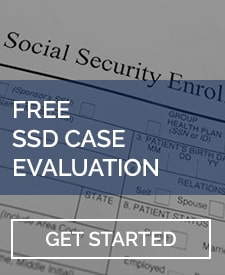When you are struggling with a disability, coping with lost work, lost wages, insecurity around your finances, medical appointments, therapies, and other aspects can be overwhelming. Trying to navigate the complex Social Security Disability maze only adds to the stress and frustration.
One area of confusion is residual functional capacity. What does this mean? We’ll answer your questions so you can proceed through the benefits process with more confidence – and a greater chance of a successful determination.
Social Security Disability
Disability can affect anyone. In fact, research indicates that more than one in four of people aged 20 years old today will become disabled before they reach the age of 67. Disability benefits provide a safety net for those who have worked long enough (this depends on age – younger disabled individuals do not need as lengthy of employment history) and who have paid Social Security taxes.
But here is a fact that most people going through the Social Security Disability process do not realize: most initial applications are denied. If you have a condition that is not included on the Social Security Administration’s (SSA) Listing of Impairments, it can be difficult to receive the benefits you need.
A big step in the process is your residual functional capacity assessment. The SSA uses this to determine if your disability will prevent you from working. It is a “medical assessment of what an individual can do in a work setting in spite of the functional limitations and environmental restrictions imposed by all of his or her medically determinable impairment(s).”
RFC is essentially the “maximum degree” to which you can engage in the physical and/or mental requirements of jobs. It is the most you can do, in a work setting, considering the limitations caused by your disability.
How Does It Work?
After your local SSA branch verifies your eligibility requirements, they send your case to Disability Determination Services in Florida. You will take a form to your doctor – the RFC form, which is also called the Attending Physician’s Statement.
In some cases, this is enough for the claims examiner to make a determination as to your RFC. In others, you may have to undergo an Independent Medical Examination. This independent doctor is hired by the SSA insurance company.
Using this form, and other medical records and doctor’s notes, the claims examiner determines how much exertion you are capable of in terms of work: sedentary, light, medium, or heavy. This is based on physical factors, such as how well you can walk, stand, lift, carry, and push/pull objects.
Determining your RFC and whether or not you are entitled to benefits gets a bit complex at this point. The SSA uses a grid to help streamline the process – though it can make it more confusing!
This section looks at those of advanced age who are able to perform sedentary work, according to their RFC. Someone with education of limited or less with no skills and/or work experience will be considered disabled and granted benefits. But someone of the same age with the same educational level who is skilled or semiskilled – skills which can be transferred to another job – will not be considered disabled.
You can see the grid sections relating to light, medium, and heavy work at the SSA’s website.
It becomes even more complex because Disability Determination Services may also look at “non-exertional limitations” and mental RFC:
Non-exertional limitations. These limitations do not relate to strength, but rather to aspects such as your ability to manipulate objects, hear, see, write, type, stoop, crawl, climb, crouch, and handle exposure to extreme temperatures, sunlight, fumes, or dust. The SSA has to determine whether these limitations prevent you from working in your old job or potential new jobs.
Mental RFC. When you apply for benefits, list any mental illnesses or difficulties that interfere with your ability to work.
If severe, the SSA develops a mental RFC. It covers areas such as your ability to understand/remember/follow instructions, maintain concentration for long periods, make simple decisions, respond appropriately to criticism, attend work regularly, interact appropriately with the public and coworkers, etc.
There is no grid for mental RFC, so SSA compares your limitations to the work required in your past job. If you can work in jobs that are less mentally demanding, you will likely not be deemed disabled. If, however, you cannot work in a simple, unskilled job, then you will be found disabled.
Make Your Case

Disability Determination Services in Florida use your medical records to make their determination, as well as your RFC form. Make sure that your doctor fills this out completely and with details regarding your physical and/or mental limitations. He or she should provide specific evidence of your disability and the impacts on your ability to work.
According to the SSA,” you are responsible for providing the evidence we will use to make a finding of your residual functional capacity. However, before we make a determination that you are not disabled, we are responsible for developing your complete medical history, including arranging for a consultative examination(s) if necessary, and making every reasonable effort to help you get medical reports from your own medical sources.”
The SSA may also consider “descriptions and observations of your limitations…by you, your family, neighbors, friends, or other persons.”
It can be overwhelming to pull together this evidence, but it is critical for a successful outcome. And you do not have to do it alone. Contact the LaBovickLaw Group for assistance. Our team has decades of experience in helping people obtain the benefits they need – the benefits to which they are entitled. Whether you are preparing your initial application or must appeal a decision, we will vigorously assist you through the process.




